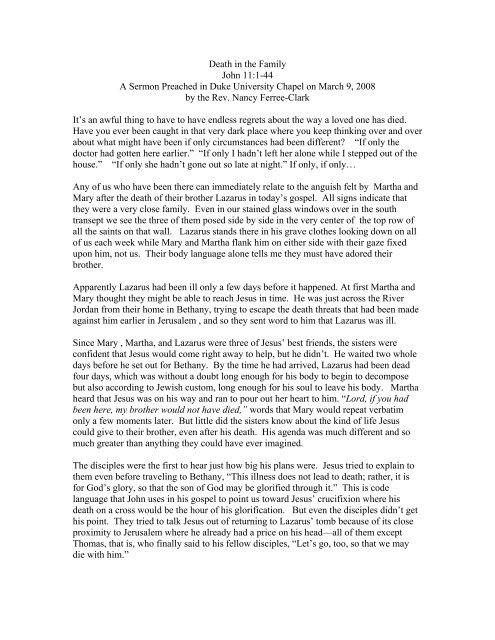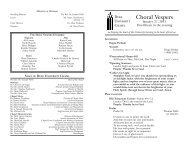Death in the Family John 11:1-44 A Sermon ... - Duke University
Death in the Family John 11:1-44 A Sermon ... - Duke University
Death in the Family John 11:1-44 A Sermon ... - Duke University
You also want an ePaper? Increase the reach of your titles
YUMPU automatically turns print PDFs into web optimized ePapers that Google loves.
<strong>Death</strong> <strong>in</strong> <strong>the</strong> <strong>Family</strong><br />
<strong>John</strong> <strong>11</strong>:1-<strong>44</strong><br />
A <strong>Sermon</strong> Preached <strong>in</strong> <strong>Duke</strong> <strong>University</strong> Chapel on March 9, 2008<br />
by <strong>the</strong> Rev. Nancy Ferree-Clark<br />
It’s an awful th<strong>in</strong>g to have to have endless regrets about <strong>the</strong> way a loved one has died.<br />
Have you ever been caught <strong>in</strong> that very dark place where you keep th<strong>in</strong>k<strong>in</strong>g over and over<br />
about what might have been if only circumstances had been different? “If only <strong>the</strong><br />
doctor had gotten here earlier.” “If only I hadn’t left her alone while I stepped out of <strong>the</strong><br />
house.” “If only she hadn’t gone out so late at night.” If only, if only…<br />
Any of us who have been <strong>the</strong>re can immediately relate to <strong>the</strong> anguish felt by Martha and<br />
Mary after <strong>the</strong> death of <strong>the</strong>ir bro<strong>the</strong>r Lazarus <strong>in</strong> today’s gospel. All signs <strong>in</strong>dicate that<br />
<strong>the</strong>y were a very close family. Even <strong>in</strong> our sta<strong>in</strong>ed glass w<strong>in</strong>dows over <strong>in</strong> <strong>the</strong> south<br />
transept we see <strong>the</strong> three of <strong>the</strong>m posed side by side <strong>in</strong> <strong>the</strong> very center of <strong>the</strong> top row of<br />
all <strong>the</strong> sa<strong>in</strong>ts on that wall. Lazarus stands <strong>the</strong>re <strong>in</strong> his grave clo<strong>the</strong>s look<strong>in</strong>g down on all<br />
of us each week while Mary and Martha flank him on ei<strong>the</strong>r side with <strong>the</strong>ir gaze fixed<br />
upon him, not us. Their body language alone tells me <strong>the</strong>y must have adored <strong>the</strong>ir<br />
bro<strong>the</strong>r.<br />
Apparently Lazarus had been ill only a few days before it happened. At first Martha and<br />
Mary thought <strong>the</strong>y might be able to reach Jesus <strong>in</strong> time. He was just across <strong>the</strong> River<br />
Jordan from <strong>the</strong>ir home <strong>in</strong> Bethany, try<strong>in</strong>g to escape <strong>the</strong> death threats that had been made<br />
aga<strong>in</strong>st him earlier <strong>in</strong> Jerusalem , and so <strong>the</strong>y sent word to him that Lazarus was ill.<br />
S<strong>in</strong>ce Mary , Martha, and Lazarus were three of Jesus’ best friends, <strong>the</strong> sisters were<br />
confident that Jesus would come right away to help, but he didn’t. He waited two whole<br />
days before he set out for Bethany. By <strong>the</strong> time he had arrived, Lazarus had been dead<br />
four days, which was without a doubt long enough for his body to beg<strong>in</strong> to decompose<br />
but also accord<strong>in</strong>g to Jewish custom, long enough for his soul to leave his body. Martha<br />
heard that Jesus was on his way and ran to pour out her heart to him. “Lord, if you had<br />
been here, my bro<strong>the</strong>r would not have died,” words that Mary would repeat verbatim<br />
only a few moments later. But little did <strong>the</strong> sisters know about <strong>the</strong> k<strong>in</strong>d of life Jesus<br />
could give to <strong>the</strong>ir bro<strong>the</strong>r, even after his death. His agenda was much different and so<br />
much greater than anyth<strong>in</strong>g <strong>the</strong>y could have ever imag<strong>in</strong>ed.<br />
The disciples were <strong>the</strong> first to hear just how big his plans were. Jesus tried to expla<strong>in</strong> to<br />
<strong>the</strong>m even before travel<strong>in</strong>g to Bethany, “This illness does not lead to death; ra<strong>the</strong>r, it is<br />
for God’s glory, so that <strong>the</strong> son of God may be glorified through it.” This is code<br />
language that <strong>John</strong> uses <strong>in</strong> his gospel to po<strong>in</strong>t us toward Jesus’ crucifixion where his<br />
death on a cross would be <strong>the</strong> hour of his glorification. But even <strong>the</strong> disciples didn’t get<br />
his po<strong>in</strong>t. They tried to talk Jesus out of return<strong>in</strong>g to Lazarus’ tomb because of its close<br />
proximity to Jerusalem where he already had a price on his head—all of <strong>the</strong>m except<br />
Thomas, that is, who f<strong>in</strong>ally said to his fellow disciples, “Let’s go, too, so that we may<br />
die with him.”
When Martha and Jesus began to talk, he said to her, “Your bro<strong>the</strong>r will rise aga<strong>in</strong>.” She<br />
thought he was referr<strong>in</strong>g to resurrection on <strong>the</strong> last day, which was a doctr<strong>in</strong>e advocated<br />
by <strong>the</strong> Pharisees that was widely accepted by pious Jews. But Jesus was actually<br />
proclaim<strong>in</strong>g someth<strong>in</strong>g new and radically different than that. He said to Martha, “ I AM<br />
<strong>the</strong> resurrection and <strong>the</strong> life. Those who believe <strong>in</strong> me, even though <strong>the</strong>y die, will live,<br />
and everyone who lives and believes <strong>in</strong> me will never die.”<br />
Whereas Martha had understood resurrection as someth<strong>in</strong>g that happens <strong>in</strong> <strong>the</strong> future,<br />
Jesus was expla<strong>in</strong><strong>in</strong>g it as someth<strong>in</strong>g that happens right now. He was not say<strong>in</strong>g that he<br />
as God’s representative has <strong>the</strong> power to give resurrection and life. He was say<strong>in</strong>g that<br />
he is those th<strong>in</strong>gs because he is one with Almighty God, <strong>the</strong> Great I Am, whose life is<br />
eternal. In Jesus’ presence, resurrection and life are present. Those who believe and<br />
trust <strong>in</strong> him will never die, no matter what becomes of <strong>the</strong>ir bodies, no matter how tragic<br />
<strong>the</strong> circumstances surround<strong>in</strong>g <strong>the</strong>ir death-- because he is one with <strong>the</strong> source and<br />
susta<strong>in</strong>er of all life.<br />
This must have been difficult for Martha to beg<strong>in</strong> to grasp <strong>in</strong> <strong>the</strong> midst of her<br />
overwhelm<strong>in</strong>g grief. Yet she did not hesitate to respond to Jesus’ question, “do you<br />
believe?” “Yes, Lord”, she said. “I believe that you are <strong>the</strong> Messiah, <strong>the</strong> Son of God, <strong>the</strong><br />
one com<strong>in</strong>g <strong>in</strong>to <strong>the</strong> world.” She knew his titles at least, even if she did not yet fully<br />
understand <strong>the</strong> depth and breadth of power <strong>the</strong>y represented. It rem<strong>in</strong>ds me of <strong>the</strong> time<br />
one of my sem<strong>in</strong>ary professors scribbled a note on a paper I wrote years ago. He gave<br />
me a good grade on it but he also asked if I recognized <strong>the</strong> power of what I had written<br />
about. In retrospect, I’ll have to say that I really didn’t. It’s one th<strong>in</strong>g to know <strong>the</strong> right<br />
words to say or write about. It’s ano<strong>the</strong>r to be transformed by those words.<br />
Martha went to tell her sister about Jesus’ arrival and Mary ran to him , weep<strong>in</strong>g, along<br />
with <strong>the</strong> mourners who had come to console <strong>the</strong>m. But Jesus did not ask <strong>the</strong> same<br />
questions of <strong>the</strong>m he had asked of Martha. The text says that as he watched Mary and <strong>the</strong><br />
o<strong>the</strong>rs wail<strong>in</strong>g out loud he was greatly disturbed <strong>in</strong> spirit and deeply moved. He asked<br />
where <strong>the</strong>y had laid Lazarus, and <strong>the</strong>y replied, “Lord, come and see”. Then Jesus himself<br />
began to weep.<br />
This is a gut-wrench<strong>in</strong>g depiction of Jesus’ own emotions and his own humanity. No<br />
o<strong>the</strong>r stories <strong>in</strong> <strong>John</strong>’s gospel bear any similarity to it. To say he was greatly disturbed <strong>in</strong><br />
spirit and deeply moved is hardly an adequate translation of <strong>the</strong> Greek, which is much<br />
more visceral. Jesus shuddered. He was angry, agitated, moved with pity. As Dean<br />
Wells said once about this passage, it was a “whole body experience”, so <strong>in</strong>tense was this<br />
moment.<br />
Why was he feel<strong>in</strong>g this way? Some scholars say it was because <strong>the</strong> o<strong>the</strong>rs were cry<strong>in</strong>g<br />
<strong>in</strong>consolably, imply<strong>in</strong>g that <strong>the</strong> grief-stricken mourners had no faith <strong>in</strong> him, but <strong>the</strong> fact is<br />
Jesus wept, too. Maybe his tears were a comb<strong>in</strong>ation of both anger and profound<br />
sadness. For Jesus to be fully human he must have experienced grief for <strong>the</strong> loss of his<br />
friend Lazarus and for <strong>the</strong> sadness of Mary and Martha; grief for <strong>the</strong> frailty of life as we<br />
know it and <strong>the</strong> randomness with which it is so easily snuffed out; grief that no one
seemed to understand what he was about , much less truly believe it. Even more so, Jesus<br />
must have felt deep anger and emotional distress that he was about to enter <strong>in</strong>to a direct<br />
confrontation with Satan over <strong>the</strong> wages of s<strong>in</strong> and death.<br />
As our Savior who was both fully human and fully div<strong>in</strong>e, Jesus had to prepare himself<br />
for <strong>the</strong> fact that his own death was near and that <strong>the</strong> action he was about to take would<br />
only hasten it . S<strong>in</strong>ce <strong>John</strong>’s gospel does not mention any struggle for Jesus on <strong>the</strong> night<br />
of his arrest, perhaps this represents his Gethsemane-- his time of anguish, his acceptance<br />
of <strong>the</strong> reality that by call<strong>in</strong>g Lazarus out of his tomb, he would <strong>the</strong>n take his place. Jesus<br />
said it as pla<strong>in</strong>ly as he could: one cannot give life unless one dies, and he made no<br />
exception for himself. As <strong>John</strong> writes at an earlier po<strong>in</strong>t <strong>in</strong> <strong>the</strong> gospel, Jesus laid down<br />
his own life and no one took it from him. (10:18). For Jesus to embrace his hour of<br />
glorification without look<strong>in</strong>g back, he first had to acknowledge his grief and <strong>the</strong> grief of<br />
<strong>the</strong> whole world so he could <strong>the</strong>n go forward to greet death unafraid, triumphant and<br />
without tears.<br />
When Jesus f<strong>in</strong>ally reached Lazarus’ tomb he told <strong>the</strong> onlookers to take away <strong>the</strong> stone.<br />
But Martha quickly <strong>in</strong>terrupted him to say that after four days <strong>the</strong> stench of death would<br />
be strong. That’s actually not a factor many of us th<strong>in</strong>k about when we view a body <strong>in</strong> an<br />
elegant casket <strong>in</strong> a softly-lit funeral home. We have licensed embalmers, make-up artists<br />
and hair stylists to thank for do<strong>in</strong>g <strong>the</strong>ir part to protect us from such up-close exposure to<br />
death, and it works, at least for a time. Haven’t you ever heard <strong>the</strong> comment made about<br />
a dead person <strong>in</strong> a casket, ”She looks so good!?” That’s def<strong>in</strong>itely not <strong>the</strong> reality of death<br />
which Martha was talk<strong>in</strong>g about. Seen <strong>in</strong> those terms, we can understand her hesitance<br />
to accept that even Jesus, <strong>the</strong> Son of God, could overturn <strong>the</strong> physical evidence of death<br />
and decay.<br />
Jesus refused to be sidetracked, so he called on Martha once aga<strong>in</strong> to trust, and <strong>the</strong>n <strong>the</strong>y<br />
took away <strong>the</strong> stone. After thank<strong>in</strong>g God for what was about to happen, Jesus shouted,<br />
“Lazarus, come out!”. And as <strong>the</strong> dead man came out, with his face wrapped and his<br />
hands and feet bound with strips of cloth, Jesus said to those who had ga<strong>the</strong>red around,<br />
“Unb<strong>in</strong>d him, and let him go.” With that it was over. Lazarus was free to walk on <strong>the</strong><br />
earth once aga<strong>in</strong>.<br />
It’s a miraculous story that you’ve probably already figured out looks and sounds a lot<br />
like Jesus’ own death and resurrection, almost as if it were a dress rehearsal of sorts. The<br />
tomb is near Jerusalem; it is a cave with a large stone cover<strong>in</strong>g it; <strong>the</strong> stone is rolled<br />
away; Jesus cries out with a loud voice; and <strong>the</strong> grave clo<strong>the</strong>s are removed from <strong>the</strong> one<br />
was dead but is now alive. Fred Craddock has suggested that if you held a light beneath a<br />
piece of paper with this story written on it you’d see <strong>the</strong> resurrection of Jesus sh<strong>in</strong><strong>in</strong>g<br />
through, and it’s true. Mary and Martha asked for <strong>the</strong>ir bro<strong>the</strong>r’s life back, which Jesus<br />
gave to <strong>the</strong>m. But by swapp<strong>in</strong>g places with Lazarus, he also offered life to <strong>the</strong> whole<br />
world through his own death and resurrection. The two stories are so artfully woven<br />
toge<strong>the</strong>r that one illum<strong>in</strong>ates <strong>the</strong> o<strong>the</strong>r, and we see Jesus, both fully human and fully<br />
div<strong>in</strong>e, as <strong>the</strong> one who br<strong>in</strong>gs forth life out of death, a presentation of <strong>the</strong> entire gospel.
Soon after <strong>the</strong> miracle took place, <strong>the</strong> three sibl<strong>in</strong>gs expressed <strong>the</strong>ir gratitude to Jesus for<br />
all he had done for <strong>the</strong>m by host<strong>in</strong>g a proper d<strong>in</strong>ner <strong>in</strong> his honor. That was <strong>the</strong> time when<br />
Mary ano<strong>in</strong>ted his feet with costly perfume and wiped <strong>the</strong>m with her hair. But even as<br />
<strong>the</strong>y enjoyed <strong>the</strong> fellowship around <strong>the</strong> table, a crowd of onlookers ga<strong>the</strong>red outside,<br />
curious to see both Jesus and <strong>the</strong> man he resurrected from <strong>the</strong> dead. The chief priests<br />
took it as a signal that both should be killed s<strong>in</strong>ce it was because of Lazarus that many<br />
believed <strong>in</strong> Jesus.<br />
Beyond that even<strong>in</strong>g, we do not know what became of Lazarus or his sisters, which<br />
leaves us with many unanswered questions. I wonder how Mary and Martha made sense<br />
of Lazarus’ resurrection if he was almost immediately confronted with threats of<br />
assass<strong>in</strong>ation because of it. I wonder how <strong>the</strong>y endured <strong>the</strong> paralyz<strong>in</strong>g grief of both<br />
los<strong>in</strong>g <strong>the</strong>ir dear bro<strong>the</strong>r a second time and watch<strong>in</strong>g <strong>the</strong>ir beloved Jesus suffer on <strong>the</strong><br />
cross. I wonder how <strong>the</strong>y susta<strong>in</strong>ed <strong>the</strong>ir belief <strong>in</strong> Jesus <strong>in</strong> <strong>the</strong> midst of fear and<br />
unfulfilled hopes.<br />
As we prepare to come to <strong>the</strong> Lord’s Table today, we, too, can relate to <strong>the</strong> challenge of<br />
susta<strong>in</strong><strong>in</strong>g our faith <strong>in</strong> times of grief and distress. We know that we must all eventually<br />
die. Even so, we go to great effort and expense to forestall it. Like Martha and Mary, we<br />
pray fervently for Jesus to protect us from it. Like Jesus, we weep from <strong>the</strong> depth of our<br />
be<strong>in</strong>g with sadness and anger at it.<br />
This week a blogger for <strong>the</strong> <strong>Duke</strong> Chronicle wrote an anguished response to <strong>the</strong><br />
horrendous murder of Eve Carson, <strong>the</strong> remarkable UNC student shot to death <strong>in</strong> a quiet<br />
neighborhood near campus. In it she said “If <strong>the</strong>re is a God, I don’t understand him.”<br />
It’s a question perhaps not that different from some of our own. Tears run down our<br />
cheeks as we wonder how many promis<strong>in</strong>g young lives have to be snuffed out by human<br />
treachery <strong>in</strong> <strong>the</strong> streets of Durham and Chapel Hill, on local college campuses and<br />
campuses around <strong>the</strong> country, <strong>in</strong> <strong>the</strong> sem<strong>in</strong>aries and streets of Jerusalem, <strong>in</strong> <strong>the</strong><br />
marketplaces and neighborhoods of Iraq and <strong>in</strong> so many o<strong>the</strong>r places on earth before <strong>the</strong><br />
world completely self-destructs.<br />
Far better to shout, “My God, my God, why have you forsaken us?” than to shrug our<br />
shoulders <strong>in</strong> numbed complacence or to cry ourselves to sleep. We know that <strong>the</strong><br />
patriarchs and prophets and even Jesus himself have shared <strong>in</strong> <strong>the</strong>se feel<strong>in</strong>gs, and we<br />
have no reason to try and hide <strong>the</strong>m. Jesus is well-acqua<strong>in</strong>ted with grief. He has<br />
absorbed <strong>the</strong> world’s pa<strong>in</strong> <strong>in</strong>to himself, and he can carry our burdens when we lay <strong>the</strong>m<br />
at his feet. He has poured out his love for us on <strong>the</strong> cross and offers to us his broken<br />
body and blood to heal and susta<strong>in</strong> us. He has called us <strong>in</strong>to community to be his liv<strong>in</strong>g,<br />
breath<strong>in</strong>g body on earth, empowered to call life out of death’s dark places ourselves until<br />
He comes aga<strong>in</strong>.<br />
Jesus knows, and we know far better than we ever wanted to know how death will come<br />
<strong>in</strong> unimag<strong>in</strong>ed ways, but none of <strong>the</strong>m are <strong>the</strong> k<strong>in</strong>d of death that separates us from God.<br />
Physical death is robbed of its power because <strong>in</strong> Christ <strong>the</strong>re is life on both sides of <strong>the</strong><br />
grave.
Let us go forth to live as those for whom death has been past ever s<strong>in</strong>ce <strong>the</strong> day of our<br />
baptism so that liv<strong>in</strong>g or dy<strong>in</strong>g, our lives are <strong>in</strong> Christ. Jesus is <strong>the</strong> resurrection and <strong>the</strong><br />
life, <strong>the</strong> source of eternal life, not just on <strong>the</strong> last day, but this very day, <strong>in</strong> this very place-<br />
if only we believe.<br />
Nancy Ferree-Clark<br />
Senior Pastor<br />
Congregation at <strong>Duke</strong> <strong>University</strong> Chapel




